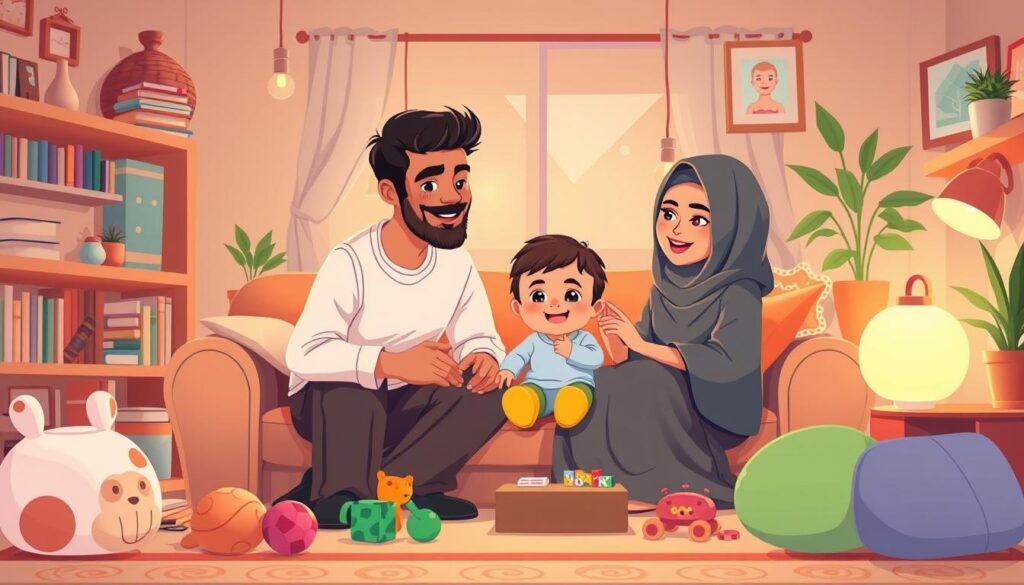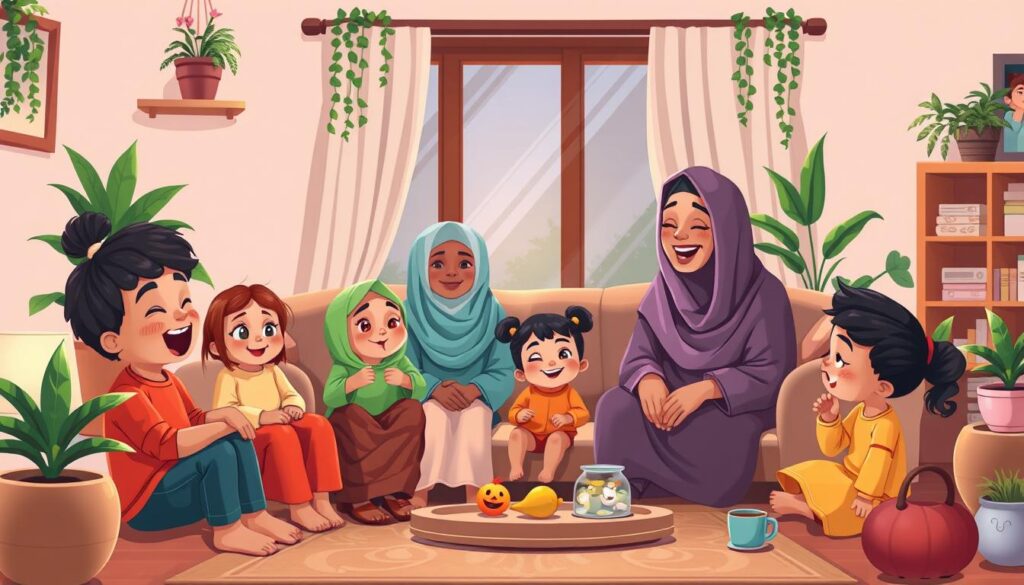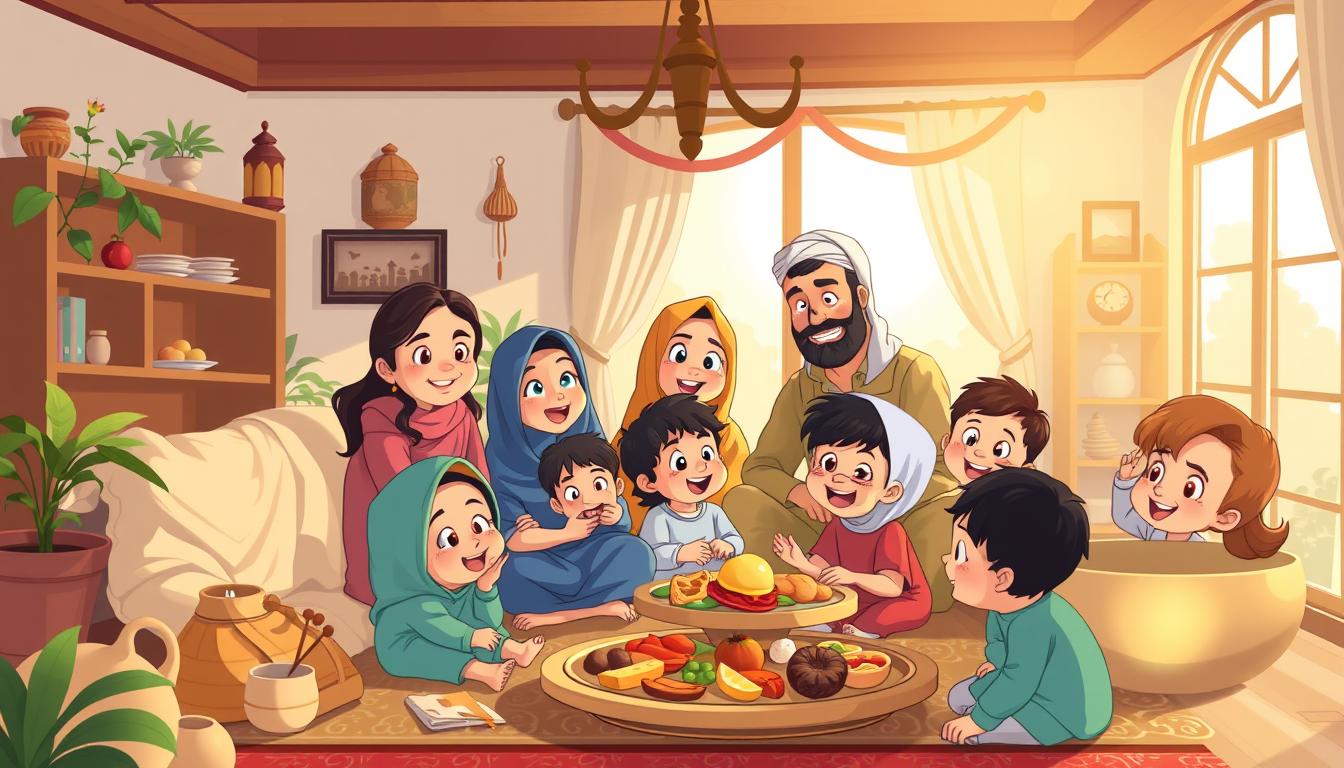Did you know Prophet Muhammad was fostered by his uncle Abu Talib? This shows how important fostering is in Islam. At Umar Khan Charity Organization, we aim to change lives through faith-based work. We focus on foster care and child adoption.
The number of orphans and abandoned kids has risen. This makes it more urgent for Muslim families to foster these children. They can do this through fostering and foster care.
Caring for orphans and abandoned kids is a moral and legal duty in Islam. We invite you to join us in this noble mission. Your support can change these children’s lives. It can give them the care and support they need through foster care and child adoption.
Key Takeaways
- Fostering children in Islam is a rewarding and challenging endeavor that requires compassion, patience, and understanding.
- The primary goal of fosterage, guardianship, and kafalah is to provide care for children who would be without a family environment.
- Foster families must care for foster children with justice and compassion. They should also involve biological parents in important decisions.
- Islamic guidelines on fostering emphasize care for the child’s educational, spiritual, and physical needs.
- We encourage you to support our cause by volunteering, sharing our mission, or donating online to help with foster care and child adoption.
- By working together, we can provide a safe and loving environment for these children. This will help them thrive through fostering children and foster care.
- Foster care offers a temporary safe space for children. Islamic communities are urged to help with spiritual, emotional, physical, and financial support for those caring for orphaned and abandoned children.
Understanding Fostering in Islam
We believe every child should have a loving family. Our community is working to increase Muslim foster homes. This is key to giving children a safe place to grow.
Fostering agencies are very important. They help foster parents with the resources they need. Together, we can make sure every child gets the care they need. Foster parents also play a big role in giving children a loving home.
Fostering in Islam is about community support and helping children. By providing a foster home, we help children grow in a safe place.
Some important parts of fostering in Islam are:
- Providing a stable and loving home for children in need
- Ensuring the child’s physical, emotional, and spiritual well-being
- Respecting the child’s cultural and religious heritage
Together, we can change the lives of these children. We can give them the care and support they need.
The Role of Compassion in Fostering
We understand how vital compassion is in the foster care system. Foster families offer a caring and supportive home to foster children. Compassion helps foster parents mix love and discipline, setting boundaries with kindness.
In the foster care world, compassion is key for building trust and safety with foster kids. By teaching empathy, foster parents help kids feel valued and loved. This can improve their emotional health and outlook on life.
Some important parts of compassion in fostering are:
- Teaching empathy to foster children
- Building trust and security
- Demonstrating the impact of compassionate care
We at our organization aim to support foster families. We focus on self-care and compassion. This helps foster kids develop a strong sense of self and worth.
Legal Aspects of Fostering in Islamic Context
Understanding the legal side of fostering in Islam is key, focusing on foster parent requirements and child adoption. It’s vital to know Islamic law and how it varies by country. This knowledge helps us create a loving home for children in need.
In Islam, laws about guardianship and documents are important for foster parents. The Fiqh Council of North America (FCNA) and the Assembly of Muslim Jurists of America (AMJA) offer guidance. For example, foster mothers may need to breastfeed infants under two to establish a bond.
Healthcare can help foster mothers with lactation, even if they’re not pregnant. Islamic law also makes exceptions for older children, ensuring they’re not raised by non-Muslims. For more on Islamic fostering laws, check out Islamicity.
Important legal points for fostering in Islam include:
- Guardianship laws and documentation
- Foster parent requirements, such as financial stability and background checks
- Concessions for fostering older children
- Induced lactation for feeding foster children

By grasping these legal points, we can foster a supportive and loving space for children. We do this while honoring Islamic law.
| Country | Legislation on Kafalah |
|---|---|
| Morocco | Specific legislation on the regulation of fosterage of children (kafalah) |
| Egypt | Specific legislation on the regulation of fosterage of children (kafalah) |
| United Arab Emirates | Specific legislation on the regulation of fosterage of children (kafalah) |
Practical Guidelines for Foster Parents
We believe every foster child needs a safe and loving home. We offer resources and support to foster families. Fostering agencies help match children with the right foster homes.
Islamic teachings stress the need for a safe and loving space for kids. Resilient parenting means setting boundaries with kindness and understanding. We provide training and support for foster parents to help them create a stable and loving home.
Creating a Safe Environment
Foster parents must ensure their home is safe from hazards. They should have a first aid kit and a fire extinguisher. They also need a plan for emergencies.
It’s important to keep confidentiality and respect the privacy of foster children. This helps them feel secure and loved.
Establishing Routines and Stability
Creating routines and stability is key for foster children’s well-being. This includes a daily schedule and setting boundaries. It also means providing emotional support and validation.
By following these guidelines, foster parents can create a safe and loving home. We are committed to supporting foster families. This helps foster children thrive emotionally and psychologically.
| Requirements for Foster Parents | Description |
|---|---|
| Age | Must be at least 21 years old |
| Background Check | Must pass a criminal background check |
| Home Study | Must complete a home study process |
Cultural Sensitivity in Fostering
We understand how vital cultural sensitivity is in fostering. It helps foster families grasp and honor the varied backgrounds and cultural practices of foster children. Our organization is dedicated to giving resources and support to foster parents. This is to help them meet the foster parent requirements needed for a caring environment.
Islamic teachings highlight the value of respecting and celebrating cultural diversity. By adopting this mindset, foster families can aid foster children in developing a strong, positive cultural identity. This is linked to better coping, higher self-esteem, and less depression. We aim to offer foster parent requirements that boost cultural awareness and competence. This way, foster families can better support the unique needs of each foster child.
Some key aspects of cultural sensitivity in fostering include:
- Learning about a child’s background, such as their music preferences or dietary habits
- Celebrating cultural traditions and holidays
- Encouraging open communication and dialogue
- Addressing subconscious bias and stereotypes
By focusing on cultural sensitivity, we aim to foster a more inclusive and supportive setting for allfoster childrenandfoster families.

Building Relationships with Biological Families
We think it’s key to build strong ties with biological families in foster care. As we deal with child adoption and work with fostering agencies, we always put the child first. Islamic teachings tell us to respect biological family rights and relationships. We aim to balance love and discipline in our care.
Studies show that kids who do well despite tough times have a supportive adult in their life. As foster families, we offer a safe space for kids to share their feelings. Working with biological parents helps keep cultural and family ties strong during reunification.
Here are some tips for building good relationships with biological families:
- Set clear communication and boundaries
- Share updates on the child’s life and experiences
- Keep biological parents involved in decisions
- Get help from social workers or case managers when needed
By working together and focusing on the child’s needs, we can create a caring environment. This environment supports positive relationships and the well-being of everyone involved. As we face the challenges of foster care and child adoption, we stay dedicated to our mission. We aim to change lives through faith-based humanitarian work.
Educating the Community on Fostering
We think it’s key to teach the community about fostering. This helps raise awareness and support for foster families and kids in need. Knowing the foster parent requirements and the foster care system helps us support these families better.
Our main goal is to build a strong, caring foster family community. We do this by training future foster parents, spreading the word about the foster care system, and getting the community involved. Together, we can positively change the lives of foster children and families.
Here are some ways to get involved:
- Becoming a licensed foster parent or respite caregiver
- Volunteering with local organizations that support foster families
- Donating to programs that provide essential items, such as diapers, for foster children
By taking these actions, we can build a caring community for foster kids. As we educate the community about fostering, we can truly make a difference in their lives.
Challenges of Fostering Children
Fostering children can be both challenging and rewarding. As we face the foster care journey, it’s key to understand the emotional and behavioral hurdles. Our organization is dedicated to helping foster families with these challenges, showing compassion and empathy.
Foster children often struggle to adjust to new homes, deal with past traumas, and form bonds with their foster families. Foster parents also face emotional challenges, like co-parenting with birth parents and saying goodbye to children when they are adopted or reunified.
Having a strong support system is vital. This includes working with fostering agencies for training and guidance. It also means accessing counseling for foster children to manage their emotions. A stable, loving environment helps foster children thrive, whether through child adoption or reunification.
Some important statistics show why addressing these challenges is so critical:
- Less than 60% of foster care youth graduate from high school
- Only 3% of children who have been in foster care go on to postsecondary education
- 25% of 19-year-old former foster care youth reported a higher incidence of health problems than non-foster care youth
Celebrating Success Stories in Fostering
At the Umar Khan Charity Organization, we are honored to share inspiring stories of foster families. These families have made a lasting impact on the lives of children in need. Their stories of resilience, compassion, and dedication show the transformative power of fostering in the Islamic faith.
Tina, a foster parent for over 24 years, provided a safe and nurturing home for a 16-year-old girl named Sarah. With Tina’s support and guidance, Sarah was able to overcome her challenges. She graduated from college and started a family of her own. These foster parent requirements and foster care system successes are a true inspiration.
The Knox Family opened their hearts and home to seven foster children, from newborns to toddlers. Their selfless commitment to provide a temporary safe haven for these vulnerable youth is a true example of fostering in Islam. By honoring cultural connections and supporting biological families, the Knox Family has set a remarkable example for the community.
As we celebrate these uplifting stories, we encourage more members of our community to consider fostering. By opening your doors and hearts, you too can make a lasting difference in the lives of children in need. This aligns with the teachings of our faith and the principles of compassionate care.






